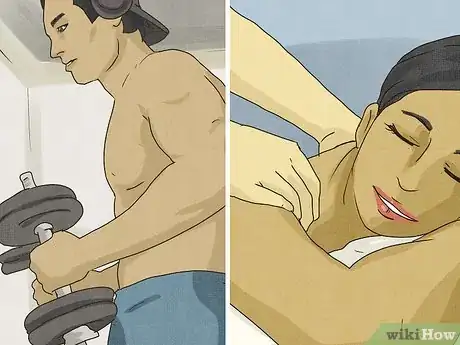This article was co-authored by Tara Vossenkemper, PhD, LPC and by wikiHow staff writer, Jessica Gibson. Dr. Tara Vossenkemper is a Licensed Professional Counselor and the Founder and Managing Director of The Counseling Hub, LLC, a group counseling practice located in Columbia, Missouri. She is also the Founder of and a Business Consultant with Tara Vossenkemper Consulting, LLC, a consulting service for therapy practice owners. With over nine years of experience, she specializes in using the Gottman Method of relationship therapy with couples on the brink of divorce, who have conflict, or who feel disconnected from one another. Dr. Vossenkemper holds a BA in Psychology from The University of Missouri, Saint Louis, an MA in Counseling from Missouri Baptist University, and a PhD in Counselor Education and Supervision from The University of Missouri, Saint Louis. She has also completed Level 3 training in the Gottman Method Couples Therapy approach and has been formally trained in both the Prepare-Enrich Premarital Couples Counseling approach and the PREP Approach for couples counseling.
There are 12 references cited in this article, which can be found at the bottom of the page.
This article has been viewed 10,672 times.
Whether you've been married for 2 years or 20 years, you can always find ways to be nicer to your spouse. If you're going through a rough patch and want to be kinder or you're just looking for ways to improve your relationship, we've got you covered. We'll go over ways to improve listening and communication so you can show your spouse what a thoughtful partner you are.
Steps
Expert Q&A
-
QuestionHow can I be nicer to my wife?
 Tara Vossenkemper, PhD, LPCDr. Tara Vossenkemper is a Licensed Professional Counselor and the Founder and Managing Director of The Counseling Hub, LLC, a group counseling practice located in Columbia, Missouri. She is also the Founder of and a Business Consultant with Tara Vossenkemper Consulting, LLC, a consulting service for therapy practice owners. With over nine years of experience, she specializes in using the Gottman Method of relationship therapy with couples on the brink of divorce, who have conflict, or who feel disconnected from one another. Dr. Vossenkemper holds a BA in Psychology from The University of Missouri, Saint Louis, an MA in Counseling from Missouri Baptist University, and a PhD in Counselor Education and Supervision from The University of Missouri, Saint Louis. She has also completed Level 3 training in the Gottman Method Couples Therapy approach and has been formally trained in both the Prepare-Enrich Premarital Couples Counseling approach and the PREP Approach for couples counseling.
Tara Vossenkemper, PhD, LPCDr. Tara Vossenkemper is a Licensed Professional Counselor and the Founder and Managing Director of The Counseling Hub, LLC, a group counseling practice located in Columbia, Missouri. She is also the Founder of and a Business Consultant with Tara Vossenkemper Consulting, LLC, a consulting service for therapy practice owners. With over nine years of experience, she specializes in using the Gottman Method of relationship therapy with couples on the brink of divorce, who have conflict, or who feel disconnected from one another. Dr. Vossenkemper holds a BA in Psychology from The University of Missouri, Saint Louis, an MA in Counseling from Missouri Baptist University, and a PhD in Counselor Education and Supervision from The University of Missouri, Saint Louis. She has also completed Level 3 training in the Gottman Method Couples Therapy approach and has been formally trained in both the Prepare-Enrich Premarital Couples Counseling approach and the PREP Approach for couples counseling.
Licensed Professional Counselor What you could do is try to actively go out of your way to do things in the love language that your partner speaks and receives love from. That's a really effective way of being nicer in a relationship.
What you could do is try to actively go out of your way to do things in the love language that your partner speaks and receives love from. That's a really effective way of being nicer in a relationship.
References
- ↑ Tara Vossenkemper, PhD, LPC. Licensed Professional Counselor. Expert Interview. 18 January 2022.
- ↑ https://www.psychologytoday.com/us/blog/meet-catch-and-keep/201501/7-simple-ways-you-can-become-better-partner
- ↑ Tara Vossenkemper, PhD, LPC. Licensed Professional Counselor. Expert Interview. 18 January 2022.
- ↑ https://bestlifeonline.com/be-a-more-thoughtful-spouse/
- ↑ https://www.helpguide.org/articles/relationships-communication/relationship-help.htm
- ↑ Tara Vossenkemper, PhD, LPC. Licensed Professional Counselor. Expert Interview. 18 January 2022.
- ↑ https://youtu.be/eFA7GYiArt0?t=180
- ↑ https://www.betterhealth.vic.gov.au/health/healthyliving/relationships-and-communication
- ↑ Tara Vossenkemper, PhD, LPC. Licensed Professional Counselor. Expert Interview. 18 January 2022.
- ↑ https://www.helpguide.org/articles/relationships-communication/conflict-resolution-skills.htm
- ↑ https://health.clevelandclinic.org/pandemic-fights-overcoming-conflict-with-your-significant-other/
- ↑ https://www.urmc.rochester.edu/encyclopedia/content.aspx?contenttypeid=1&contentid=4580
- ↑ https://youtu.be/byZYOQ7OmAk?t=131
- ↑ https://greatergood.berkeley.edu/article/item/to_know_you_is_to_love_you
- ↑ https://www.marriage.com/advice/relationship/5-self-care-tips-in-an-unhappy-marriage/







































































